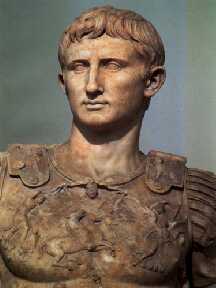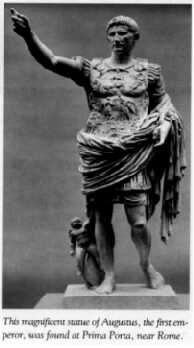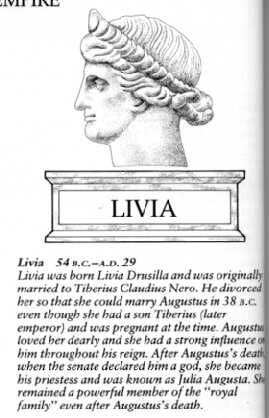Caesar Augustus, 1rst Roman Emperor
aka Gaius Octavius (Octavian)
Born: 63 BC in Rome
Died: 14 AD
Father: Caius Octavius, Senator of Rome (d59 BC)
Mother: Atia Balbus
Spouse1: Scribonia (dau of Lucius Scribonius, Libo of Rome)
Spouse2: Livia (m. 38 BC)
Children:
w/Scribonia
Julia m. Marcus Vipsanius Agrippa
Picture at right from tAR p36 ===>>
|

from tSfC p128c |

from tAR p36 |
For background, see Julius Caesar.
JC2: "... Caesar used his powers justly, giving Rome many needed reforms ... [he refused the title Emperor out of respect for the Senate, but was k. 44 BC by Brutus and others at the Senate by '23 plunging daggers'] they decided that only by killing him could they save the Republic ... Soon after Caesar was killed, though, the Roman Republic also died. Caesar's adopted son, Octavius, and his lieutenant, Marc Antony, defeated his chief assassins in 42 BC. Then they turned on each other. The civil war between Octavius and Antony finally killed the Republic. Octavius prevailed and took the position that Caesar would not - first emperor of Rome. Like all Roman emperors to come after him, Octavius adopted the name Caesar. Even after the last Caesar ruled Rome, despots and kings used the name Caesar to invoke the powers of supreme command - in Russian, czar (or tsar); in German, kaiser; and in Arabic, qaysar. Perhaps because of his absolute power, Julius Caesar will live always as the symbol of the eternal tyrant."
tIoJC: The conspirators [who killed Julius Caesar] failed for 2 reasons; 1) His death unleashed a backlash by "plebes, populares, and soldiers [who] saw him as their champion" (97) and 2) "the republic they were defending existed more in their minds than in reality. As Caesar had long ago realized, [it] had been dying of mortal wounds ever since ... Marius and Sulla" (97). For a time, Rome was paralyzed, then civil war ensued. "After driving the conspirators and their supporters from Italy, Antony soon joined forces with Marcus Lepidus, a powerful general, and Gaius Octavius, known as Octavian. Caesar's gnephew and adopted son, the 18yo Octavian appeared at first glance [weak] ... Only Cicero [forsaw his rise] ... Antony, Octavian, and Lepidus formed the 2nd Triumvirate in the winter of 43 and, in a purge reminiscent of those of Marius and Sulla, immediately began eliminating their enemies. Cicero, the last great republican remaining in Rome, was first on their hit list, and they hung his head in the city's main square. The triumvirs then proceeded to Greece, where Cassius, Brutus, and their republican diehards had raised an army with which to make their last stand. In the summer of 42, near Philippi, in N Greece, Caesar's successors crushed these last remnants of the republic. Overcome with anguish and hopelessness, Cassius and Brutus committed suicide ... [the triumvirs then turned on one another] Antony and Octavian first pushed Lepidus aside and then fought each other ... As Caesar had done, Antony took Cleopatra as a lover and ally. But the lovers' dreams of ruling Rome together evaporated when Octavian decisively defeated them in a huge sea battle near Actium, in W Greece, in the spring of 31 [with the aid of his friend, the military strategist Marcus Agrippa 99]. Antony and Cleopatra fled to Alexandria and soon afterward, with Octavian closing in on them, they took their own lives" (98). Octavian became Rome's first emperor (i.e. Imperator Augustus Caesar or 'The Great Victor and Ruler'), and after 15 yrs of civil war since Julius Caesar's death, most people were relieved at his imposed order and stability (i.e. happy to trade some freedom). "Under the long line of Augustus's successors, each of whom also took the prestigious title of Caesar, Rome continued to expand until it encompassed 3.5 million square miles and more than 100M people" (100).
Original name Gaius Octavius. After the death of (grand-uncle and adoptive father) Julius Caesar received the name Gaius Julius Caesar Octavianus. When he became emperor (imperator), the title Augustus (revered, venerable) was conferred by the Senate. He was a patron of art, letters, and science, was the friend of Ovid, Horace, Vergil, and Livy. He so beautified the city of Rome that he boasted that he found Rome a city of brick and left it a city of marble. He gave Rome a good administration, seeking to strengthen and stabilize rather than enlarge borders of empire. Rome reached its greatest glory during his reign, which came to be known as the Augustan Age and the golden era of literature. By decree of the Senate the Roman month Sextilis was renamed Augustus (now August) in his honor. 3 times during his 41yr reign were the 'gates of Janus' closed, meaning Rome was at peace. One of these was significantly at the time when Christ, the Prince of Peace, was born in Bethlehem of [Roman province] Judea (from WBDC).
"In 1863, an Italian excavator discovered a large statue of Augustus [pictured above] (which has become known as the 'Prima Porta Augustus') in [Prima Porta, near] Rome. In perfect condition, the sculpture shows him wearing a magnificent breastplate and raising his right arm in a gesture of serene majesty, a fitting symbol of the proud and splendid age he oversaw" (tAR p36).
See [? RoAR or FoRE] for a pic of a statue of the elder Augustus.

from tRW p?
Here's another webpage on Augustus.
Sources:
- tIoJC = (The Importance of) Julius Caesar, Don Nardo, Lucent Bks, 1997 (FHL).
- JC2 = Julius Caesar, Robert Green, Franklin Watts (Grolier), 1996 (FHL).
- tAR = The Ancient Romans, Don Nardo, Lucent, 19?? (FHL).
- tSfC = The Search for Cleopatra, Michael Foss, Arcade, 1997 (FHL).
- WBDC = The Wycliffe Biographical Dictionary of the Church, Eds. Elgin S. Moyer, Earle Cairns, Moody, 1982 (SBC).
- RoAR = Rulers of Ancient Rome, Don Nardo, Lucent, 1999, Mustang.
- tRW = The Roman World, Mike Corbishley, Warwick, 1986 (FHL).




